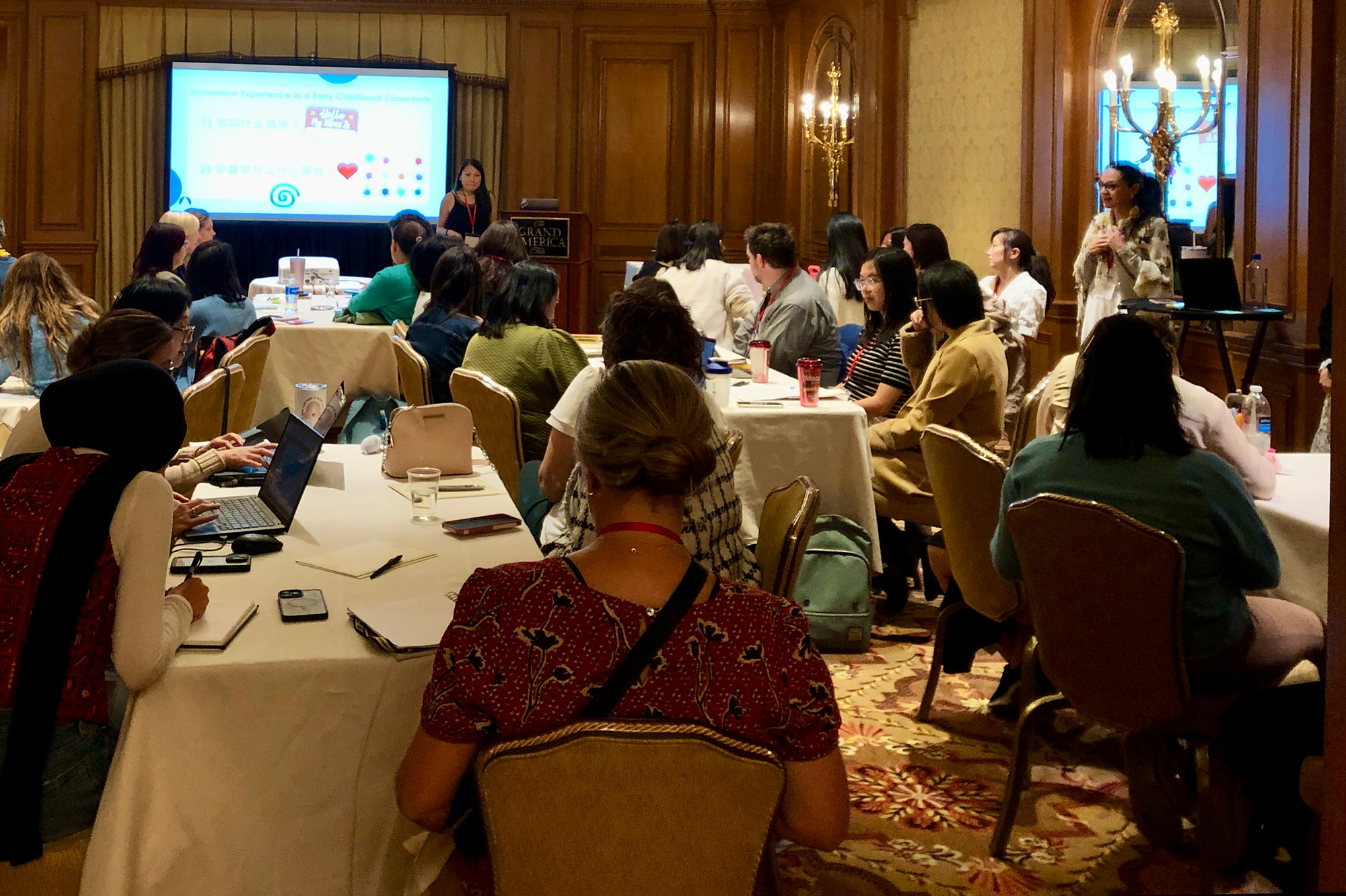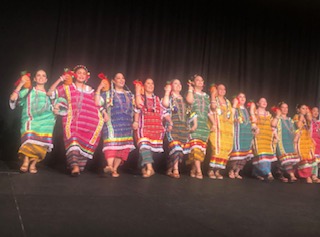L2TReC Hosts Successful International Dual Immersion Conference in Salt Lake City
On October 2-5, the College of Humanities' Second Language Teaching & Research Center (L2TReC) hosted the 9th International Conference on Immersion and Dual Language Education at the Grand America Hotel in Salt Lake City. An interdisciplinary audience of nearly 650 practitioners and researchers from both the K-12 and higher education participated in tours of local dual language immersion (DLI) schools, 14 pre-conference workshops, 115 conference sessions, and two symposia.
Johanna Watzinger-Tharp, Professor Emerita of Linguistics at the University of Utah and Hollis Robbins, former Dean of the College of Humanities, both offered welcomes to the conference attendees. Watzinger-Tharp highlighted Utah's exemplary DLI Program and noted, “Here in Utah we are fortunate that researcher/practitioner partnerships extend across public and postsecondary institutions, with universities deeply engaged with Utah’s K-12 dual language immersion programs.” Referring to Utah’s extensive Dual Language Immersion Program, Robbins stated, “I can think of no other program that delivers as much value before students even come to universities than the immersion program.”

Conference attendees at the Grand America Hotel. Photo credit: Cherice Montgomery
Sydnee Dixon, Utah State Superintendent of Public Instruction, introduced Angélica Infante-Green, Commissioner of Elementary & Secondary Education of Rhode Island, who delivered the opening keynote address, “The Power of Multilingualism in a More Interconnected World,” that drew on personal elements from her own story of growing up bilingual in New York and raising multilingual children as well as her notable professional experience in creating dual language immersion programs, including the nation’s first DLI program for children with autism. She discussed the relationships between family, culture, and language, and the assumptions that we make about each other based on language and culture.
Bringing an interactive element to the keynote, Infante-Green invited the audience to participate. “I’m going to give you a quick, quick assignment. Pick a language. If you pick English, the assignment will be more of an emphasis on individualism. If you pick a language like Chinese, Korean, or Arabic, it has more of a community emphasis. Think about a language that is more hierarchical, like Japanese,” Infante-Green said. “You’re going to get different solutions to the same problem. Language is not just communicating, but it is thinking, and it is how we work together.”
She emphasized that dual language programs are not just feel-good projects or a nice addition to a résumé, but that multilingualism changes the capacity of our minds and the way we think. She also pointed out that educators and researchers “…do look at outcomes. We do look at how students fare. And time and time again, if students are in a dual language program, they are going to outperform their peers in both languages.” Infante-Green concluded her talk by reminding us that while multilingualism is for everyone, these global opportunities cannot exist for the next generation without investment in dual language and bilingual education programs.
The second keynote speaker, introduced by L2TReC Director Devin Jenkins, was Kristin J. Davin, Professor and Program Director of World Language Education at the University of North Carolina at Charlotte. Davin’s keynote, titled “Leveraging the Seal of Biliteracy to Promote Multilingualism for All,” began with a funny anecdote about her own first immersive language experience on a study abroad trip in Sevilla, Spain, where after many years of studying Spanish in classrooms, she realized…she really didn’t speak Spanish after all. “Being immersed in another language completely changed my entire life trajectory,” she reflected. “It changed the way I empathized with other people; it made me such an open-minded person; it fundamentally re-wired my brain and changed the way I am in the world.”
Davin’s keynote then focused on research that has shown how the Seal of Biliteracy awards given to high school students to recognize proficiency in two or more languages can be a powerful tool for learners and for schools. Sharing her results from surveys and interviews with high school students, Davin summarized why students valued the Seal of Biliteracy: post-secondary opportunities, intergenerational expectations, and support of one’s family heritage language. Like Infante-Green, Davin highlighted the inseparable threads of language, culture, and identity.
Davin then turned to programmatic implications, noting that Seal of Biliteracy programs can have a positive impact on program-wide practices such as a competency-based rather than deficit-based understanding of biliteracy, and boost enrollment in world language classes. She further discussed how pathways from K-12 to post-secondary education can help increase enrollment and completion of world language majors and minors. Using examples of school districts, Davin advanced the perspective that pathway programs “strengthen language programming and also to help the community realize what an asset multilingualism is,” before concluding with resources to set up pathways in school districts that do not yet have them. She sent the audience off with a cheerful exhortation to go out and build the infrastructure needed to make multilingualism accessible to, and celebrated for, all students.
The conference sessions included a broad array of topics, ranging from curricular best practices to academic leadership to building successful programs from the ground up. A few workshops and presentations focused on Utah’s successful Bridge Program for Advanced Language Learning, which leads the nation in advanced language programs for secondary education students, and upon which several other states are modeling their own programs. Jenkins called the conference an “incredible confluence of dual language teachers and administrators at all levels. The sheer magnitude of the conference is impressive, but the strength of the presentations that I saw this weekend will provide valuable insights to many teachers for the rest of their careers.”

Ballet Folklorico Quetzalcoatl's closing performance. Photo credit: Cherice Montgomery
The conference closed on Saturday with an emotional and energizing performance from
Ballet Folklorico Quetzalcoatl, featuring a musical performance and traditional dancing.
2024 marks the third time that L2TReC has hosted this rotating conference, and feedback
from attendees was overwhelmingly positive. One attendee wrote, “I wanted to congratulate
you on a great conference. Everyone I talked to mentioned how smooth and successful
everything was.”
It takes a tremendous amount of effort to host an international conference of this
magnitude, and the College congratulates the talented and dedicated L2TReC team for
organizing this successful event and contributing to national efforts to bring multilingualism
to all.
The next conference will be hosted in 2026 by the University of North Carolina, Charlotte.
